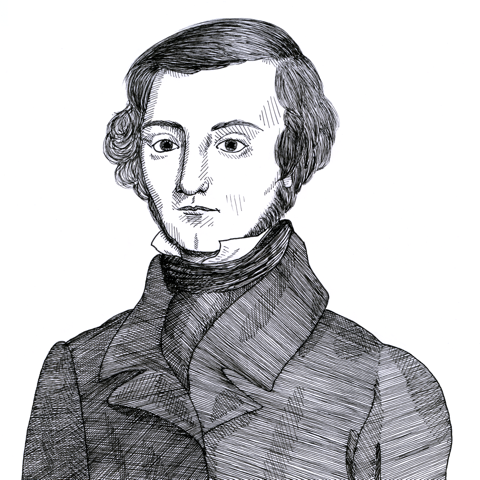Liberty Matters
Beyond Labels

I would next like to take up the question raised by Daniel Mahoney regarding what kind of “liberal” Tocqueville was. Mahoney is justified, I think, in calling him a “conservative liberal,” but one wonders what Tocqueville would have said about that. I have no way of offering a clear answer to this question, but as a second best, I propose that we consider three key passages drawn from different writings of Tocqueville from 1837 to 1841. The first one is a note accidentally found and published for the first time by his biographer, Antoine Redier in 1925; the second is from Tocqueville’s notes for Democracy in America; the third is from a letter to his English translator, Henry Reeve.
In the first, “My instincts, my opinions” (probably from 1841), Tocqueville described his political beliefs as follows:
I have an instinctual preference for democratic institutions, but I am aristocratic by instinct, that is I despise and fear the crowd. I passionately love freedom, legality, the respect for rights but not democracy. This is the base of my soul. I hate demagogy, the disorderly action of the masses, their violent and uneducated participation in affairs, the lower classes’ envious passions, the irreligious tendencies.… I belong neither to the revolutionary party nor the conservative party. But in the end I hold more to the latter than to the former. For I differ from the second more by the means than by the end, while I differ from the former by both means and end. Freedom is the first of my passions. This is what is true.
Here we have the conservative side of Tocqueville, who distrusts the disorderly actions of the masses.
The second fragment seems to tell a slightly different story and was written in 1837-38, as Tocqueville was conceiving volume two of Democracy in America.
You see that my tendencies are always democratic. I am a partisan of democracy without entertaining any illusions about its flaws and without ignoring its dangers. I am an even greater partisan [of democracy] since I believe that I see more clearly than others, because I am profoundly convinced that there is no means of stopping its triumph, and that it is possible to diminish the evils it brings and to produce the good it promises only by working with it and guiding it as much as possible.
Tocqueville argues here not only that democracy could not be stopped, but also that its triumph was both right and beneficial for mankind, if democracy can be properly “moderated” and purified of its anarchical tendencies.
Finally, in a famous letter to Henry Reeve in 1837, Tocqueville presented himself as an impartial observer placed in a perfect equilibrium between past and future, or between aristocracy and democracy. The chance of birth had made him very comfortable defending both the values of aristocracy and democracy. “In a word,” he concluded, “I was so thoroughly in equilibrium between the past and the future that I felt naturally and instinctively attracted toward neither the one nor the other. I did not need to make great efforts to cast calm glances on both sides.”
What then of Tocqueville’s “true” convictions? François Furet once described him as “a democrat by intellect but an aristocrat at heart,” while Alan Kahan referred to him as “an aristocratic liberal.” I once described him as an unconventional, eclectic moderate. All these labels are probably justified, but they may not render full justice to the complexity of Tocqueville’s political vision. Yet they all suggest that the greatness of Tocqueville does not lie in any single doctrine that he may have espoused but in the ambivalent and critical ways in which he analyzed the multiple facets of democracy as a new social condition and form of government.
Copyright and Fair Use Statement
“Liberty Matters” is the copyright of Liberty Fund, Inc. This material is put on line to further the educational goals of Liberty Fund, Inc. These essays and responses may be quoted and otherwise used under “fair use” provisions for educational and academic purposes. To reprint these essays in course booklets requires the prior permission of Liberty Fund, Inc. Please contact oll@libertyfund.org if you have any questions.